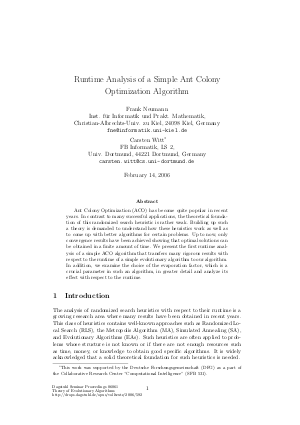Runtime Analysis of a Simple Ant Colony Optimization Algorithm
Authors Frank Neumann, Carsten Witt
-
Part of:
Volume:
Dagstuhl Seminar Proceedings, Volume 6061
Part of: Series: Dagstuhl Seminar Proceedings (DagSemProc) - License:
 Creative Commons Attribution 4.0 International license
Creative Commons Attribution 4.0 International license
- Publication Date: 2006-07-07
File

PDF
DagSemProc.06061.8.pdf
- Filesize: 200 kB
- 17 pages
Document Identifiers
Subject Classification
Keywords
- Randomized Search Heuristics
- Ant Colony Optimization
- Runtime Analysis
Metrics
- Access Statistics
-
Total Accesses (updated on a weekly basis)
0Document
0Metadata
Abstract
Ant Colony Optimization (ACO) has become quite popular in recent years. In contrast to many successful applications, the theoretical foundation of this randomized search heuristic is rather weak. Building up such a theory is demanded to understand how these heuristics work as well as to come up with better algorithms for certain problems. Up to now, only convergence results have been achieved showing that optimal solutions can be obtained in a finite amount of time. We present the first runtime analysis of a simple ACO algorithm that transfers many rigorous results with respect to the expected runtime of a simple evolutionary algorithm to our algorithm. In addition, we examine the choice of the evaporation factor, which is a crucial parameter in such an algorithm, in greater detail and analyze its effect with respect to the runtime.
Cite As Get BibTex
Frank Neumann and Carsten Witt. Runtime Analysis of a Simple Ant Colony Optimization Algorithm. In Theory of Evolutionary Algorithms. Dagstuhl Seminar Proceedings, Volume 6061, pp. 1-17, Schloss Dagstuhl – Leibniz-Zentrum für Informatik (2006)
https://doi.org/10.4230/DagSemProc.06061.8
BibTex
@InProceedings{neumann_et_al:DagSemProc.06061.8,
author = {Neumann, Frank and Witt, Carsten},
title = {{Runtime Analysis of a Simple Ant Colony Optimization Algorithm}},
booktitle = {Theory of Evolutionary Algorithms},
pages = {1--17},
series = {Dagstuhl Seminar Proceedings (DagSemProc)},
ISSN = {1862-4405},
year = {2006},
volume = {6061},
editor = {Dirk V. Arnold and Thomas Jansen and Michael D. Vose and Jonathan E. Rowe},
publisher = {Schloss Dagstuhl -- Leibniz-Zentrum f{\"u}r Informatik},
address = {Dagstuhl, Germany},
URL = {https://drops.dagstuhl.de/entities/document/10.4230/DagSemProc.06061.8},
URN = {urn:nbn:de:0030-drops-5928},
doi = {10.4230/DagSemProc.06061.8},
annote = {Keywords: Randomized Search Heuristics, Ant Colony Optimization, Runtime Analysis}
}
